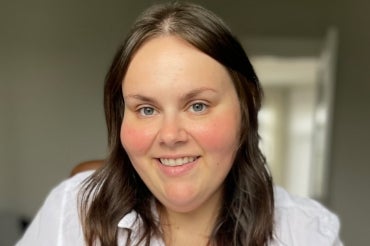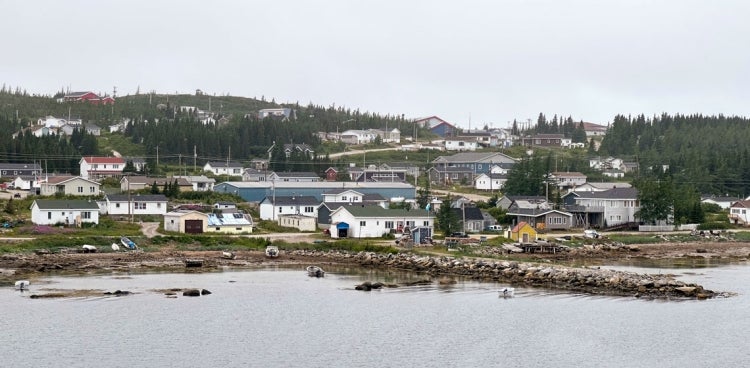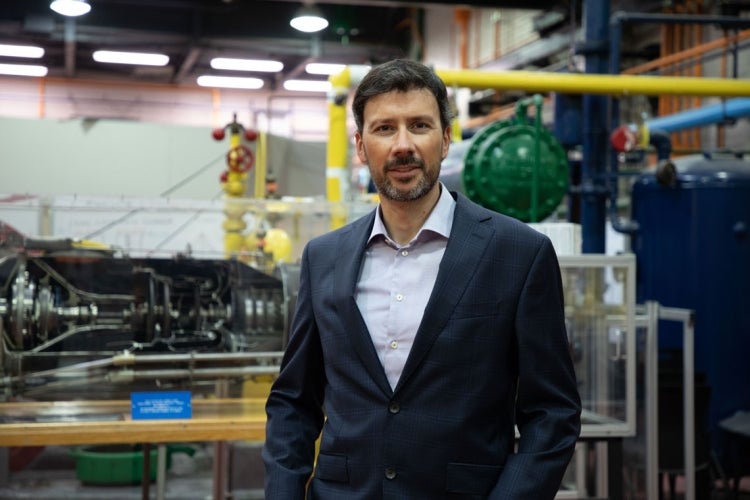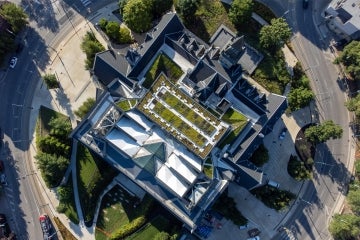PhD student aims to change how engineering is done in northern and Indigenous communities

Raylene Mitchell, who grew up in an Inuit community of about 350 people on the coast of Labrador, says many large engineering projects in the region failed to properly include local communities in the design process (supplied image)
Published: September 1, 2023
Raylene Mitchell will begin her studies as a PhD candidate in the University of Toronto’s Faculty of Applied Science & Engineering this fall – and while engineering was not where she expected to find herself, she hopes that her experience will help change that expectation for others.
Mitchell grew up in Makkovik, an Inuit community of about 350 people on the coast of Labrador that is only accessible by air in winter, or by sea in summer.
“Growing up in such a small place, I had never met any engineers, and I didn’t really know what engineering was,” she says. “What I did know was that there had been many large engineering projects built in Labrador, and that many of them had later failed. And I knew that none of these projects had included any proper channels to incorporate the community into the early stages of the design process.”
About a decade ago, Mitchell moved to Newfoundland. She enrolled at Memorial University, where she initially chose to major in commerce. However, she didn’t find her courses very fulfilling. Despite having been told earlier that STEM wasn’t for people like her, in her third year, she decided to switch into electrical engineering.
“I didn’t tell my parents at first, because I wanted to be sure it was what I wanted to do,” she says.
“But I found that I could actually do it; it just took a little more work. And I found myself falling into this place of understanding, that this is a way I could change how engineering is done in northern and Indigenous communities. That really inspired me to keep going.”

Mitchell, who is in the department of mechanical and industrial engineering, is one of three 2023 recipients of the IBET Momentum Fellowships, along with LaShawn Murray, who is also a PhD candidate in the department of mechanical and industrial engineering, and Chantel Campbell, a PhD candidate in biomedical engineering. Fellowship recipients receive financial support, mentorship, training and networking opportunities to foster a robust professional community.
For her PhD, Mitchell will be working with David Sinton, a professor in the department of mechanical and industrial engineering, who she initially met through Professor Michael Ross, the NSERC Industrial Research Chair in Northern Energy Innovation at Yukon University.
“I had been working with Dr. Ross as a research assistant for nearly two years, building wind turbine models for Indigenous communities in the Yukon,” Mitchell says. “I told him I was thinking about doing a PhD, and he connected me with Professor Sinton. I’m planning to be co-supervised by both of them.”
Mitchell’s thesis will focus on the challenges of building renewable energy infrastructure in Northern Canada and remote Indigenous communities.
Currently, many of these communities rely on diesel generators for their power. Augmenting or replacing these with solar cells or wind turbines could lower emissions, but it also raises issues around intermittency since many northern communities do not receive any sunshine for months at a time – and while wind is plentiful, it is also unpredictable.
Sinton and his team have been developing new ways to convert excess renewable electricity into fuels that could be stored for months or years. As these methods mature, the research focus is pivoting toward scale-up and demonstration, including in challenging environments such as the North.

But if the team is to build a demonstration facility, Mitchell says they will need to work carefully to avoid making the same mistakes as the large-scale engineering projects that she remembers from her childhood in Labrador.
“We want to understand how an energy storage solution – especially one based on a new, emerging technology – could impact the community,” she says.
“Does the community want this? What kind of social framework are we working with? How are we going to fairly include the community into an open discussion that includes the current need, but also the future risks?”
The project encapsulates the kind of change that Mitchell hopes to effect – both in terms of mitigating the damage of climate change, as well as renegotiating the relationships between large-scale engineering projects and the communities involved.
The timing could not be better. Earlier this year, a multidisciplinary team of researchers from across Canada – including Sinton and Ross – kicked off a national research project on energy storage called CANSTOREnergy, funded by the New Frontiers in Research Fund Transformation Program.
Mitchell also hopes that by taking up the IBET Momentum Fellowship, she can help to change the perception of what an engineer looks like.
“I’m Inuit, not First Nations, and I come from Makkovik, not the Yukon, but there is a shared history and shared pain there in terms of what those from outside our communities have imposed on us,” she says.
“Indigenous people are engineers at their core – we have been creating engineering solutions to living in challenging environments for hundreds of years. I have a unique standpoint, and I’m hoping that I can use it to help the communities that this technology is meant to serve.”



